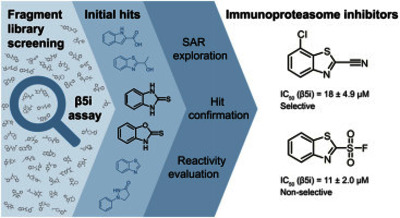Kollár, Levente and Gobec, Martina and Szilágyi, Bence and Proj, Matic and Knez, Damijan and Ábrányi-Balogh, Péter and Petri, László and Imre, Tímea and Bajusz, Dávid and Ferenczy, György and Keserű, György Miklós (2021) Discovery of selective fragment-sized immunoproteasome inhibitors. EUROPEAN JOURNAL OF MEDICINAL CHEMISTRY, 219. No.-113455. ISSN 0223-5234
![[img]](http://real.mtak.hu/129839/7.hassmallThumbnailVersion/1-s2.0-S0223523421003044-ga1.jpg)
|
Text (Graphical abstract)
1-s2.0-S0223523421003044-ga1.jpg Download (26kB) | Preview |
|
|
Text
Kollaretal._2021_Discoveryofselectivefragment-sizedimmunoproteasomeinhibitors.pdf - Published Version Restricted to Repository staff only Download (2MB) | Request a copy |
Abstract
Proteasomes contribute to maintaining protein homeostasis and their inhibition is beneficial in certain types of cancer and in autoimmune diseases. However, the inhibition of the proteasomes in healthy cells leads to unwanted side-effects and significant effort has been made to identify inhibitors specific for the immunoproteasome, especially to treat diseases which manifest increased levels and activity of this proteasome isoform. Here, we report our efforts to discover fragment-sized inhibitors of the human immunoproteasome. The screening of an in-house library of structurally diverse fragments resulted in the identification of benzo[d]oxazole-2(3H)-thiones, benzo[d]thiazole-2(3H)-thiones, benzo[d]imidazole-2(3H)-thiones, and 1-methylbenzo[d]imidazole-2(3H)-thiones (with a general term benzoXazole-2(3H)-thiones) as inhibitors of the chymotrypsin-like (β5i) subunit of the immunoproteasome. A subsequent structure-activity relationship study provided us with an insight regarding growing vectors. Binding to the β5i subunit was shown and selectivity against the β5 subunit of the constitutive proteasome was determined. Thorough characterization of these compounds suggested that they inhibit the immunoproteasome by forming a disulfide bond with the Cys48 available specifically in the β5i active site. To obtain fragments with biologically more tractable covalent interactions, we performed a warhead scan, which yielded benzoXazole-2-carbonitriles as promising starting points for the development of selective immunoproteasome inhibitors with non-peptidic scaffolds.
| Item Type: | Article |
|---|---|
| Subjects: | Q Science / természettudomány > QD Chemistry / kémia R Medicine / orvostudomány > RZ Other systems of medicine / orvostudomány egyéb területei |
| SWORD Depositor: | MTMT SWORD |
| Depositing User: | MTMT SWORD |
| Date Deposited: | 21 Sep 2021 01:57 |
| Last Modified: | 21 Sep 2021 01:57 |
| URI: | http://real.mtak.hu/id/eprint/129839 |
Actions (login required)
 |
Edit Item |




